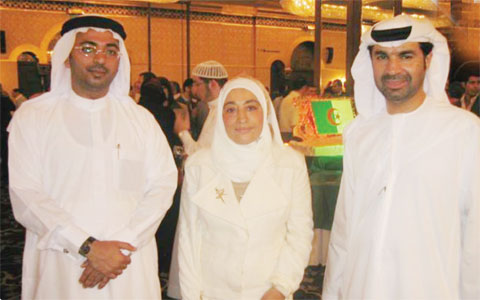 Spending only a year in Kuwait to study Arabic at Kuwait University's language center, French activist and writer of Algerian origin Farida Boumedjeria seems to have had such a wonderful experience, that she keeps remembering it and even highlighted this experience in her first book published in Paris - Lignes De Foi, Lignes Devie (Lines of Faith, Lines of Life).
Spending only a year in Kuwait to study Arabic at Kuwait University's language center, French activist and writer of Algerian origin Farida Boumedjeria seems to have had such a wonderful experience, that she keeps remembering it and even highlighted this experience in her first book published in Paris - Lignes De Foi, Lignes Devie (Lines of Faith, Lines of Life).
The title of her book resonates like an echo coming from the deepest part of her soul, mainly because she is a woman, but also as her work reveals a testimony and a narrative with particular tendencies. She uses both the genre of autobiography and the makeup of stories inspired by real facts in order to direct attention to the ills of society. In her own way, Boumedjeria proclaims her fight against indifference and in favor of "better living together" against the confusion that is increasingly worrying the Muslim community, namely regarding topics that involve headscarves and Islamophobia. Throughout the pages of her book, she welcomes her readers into a religious journey, filled with astonishing and moving memories that she recalls.
All the energy she puts into her fight against negative ideas is felt, as she draws from her divine nectar, precious treasure and endless sources. She speaks about her fervor and prayers to God with modesty, but also with openness regarding the events in her life, her feelings, her studies, her trip to Kuwait to learn literary Arabic and her wonderful meeting with Fatima.
Original style
The author reveals her personality and explains, as a coach, why learning can occur at any age, and why we should never give up or lose hope. This book was conceived as a guide for good practices and written in an original style, as a source of inspiration for those who would like to focus on the way they should live their lives. Racism often stems from ignorance, prejudice and stereotypes, since we humans fear differences. We defend ourselves by resorting to distrust or even brutality against other human beings whose appearance, tradition, culture or religion do not match ours. Seeing today's difficult context, it is important to encourage goodwill regarding actions, to actively participate in the structure of a human society, of a multicultural France where communication is possible and essential.
Boumedjeria's strong temperament enables her to express her indignation, but also her joys, thanks to the tip of her pen and the buttons of her keyboard. Indeed, Boumedjeria writes a lot! In her own way, she proclaims her fight against indifference and in favor of "better living together". While the strength that leads her and the conviction and faith to which she holds are part of her inspiration, the ink of her thoughts is as brilliant as the timeless spaces where the divine spirit reigns, as luminous as the Kuwaiti landscapes that dazzled her, that are as pure as the sand of the desert where little princes meet.
Anti-Muslim acts
"The situation has become dramatic in France, as anti-Muslim acts are now increasing throughout the planet as if we are responsible for all human tragedies", Boumedjeria told Kuwait Times, noting that no one should be held responsible for the actions of others and that some French citizens do not make any distinction between the majority of Muslim believers, who hold a humanist message and respect cohabitation with other beliefs, and the violent practices of a minority of adherents. She allocates a considerable proportion of her book to counter the Islamophobia prevailing in France as well as throughout Europe and the world.
On the other hand, Boumedjeria highly appreciated her stay in Kuwait, and in her book, describes the trip as "wonderful" due to "warm welcome of Kuwaitis, the serenity, the diversity and the tolerance of this magnificent country". She even added a full section at the end of the book with photos showing her cultural participations in Kuwait. During her stay in Kuwait as a KU student, she took part in two international events bringing together students from various countries worldwide.
Boumedjeria also notes that her Charity organization, Acreamana, organized two events with KU's petroleum engineering students at Khaldiya campus and at KU's women campus in Kaifan in 2012. Boumedjeria's fascination with Kuwait is very clear in the preface dedicated to KU's language center's acting director Ibrahim Nasser, language teachers Khaled Al-Fadhli and Yaqoub. The dedication also shows gratitude to the Kuwaiti government for hosting her and sending her for umrah. She thanked the Embassy of France in Kuwait and many of her friends at KU's female dormitory in Kaifan. In conclusion, Boumedjeria stressed that she intends to translate her book into both Arabic and English in order to allow more Arabic (namely Kuwaiti) and non-Arabic readers to benefit from her experience.
By Hassan Abdel Bari

